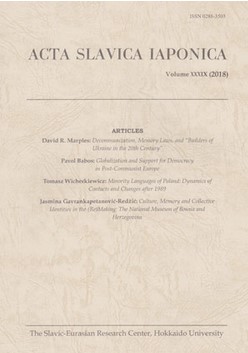Soviet Identity Politics in Ukrainian Crimea: Friendship of the Peoples and Internal Borders in the USSR between the 1950s and the 1980s
Soviet Identity Politics in Ukrainian Crimea: Friendship of the Peoples and Internal Borders in the USSR between the 1950s and the 1980s
Author(s): Zbigniew WojnowskiSubject(s): Political history, Government/Political systems, Political behavior, Politics and society, Post-War period (1950 - 1989), Political Essay, Inter-Ethnic Relations, Ethnic Minorities Studies, Geopolitics, Politics and Identity
Published by: Slavic Research Center
Keywords: Soviet Identity Politics; Ukrainian Crimea; Interethnic confrontations; Russian occupation of Crimea in 2014; border politics; Russo-Ukrainian ethnic divide;
Summary/Abstract: In July 1976, the Soviet Ukrainian government assigned a recent graduate of the Kherson agricultural institute to his first job posting in Crimea. Keen to encourage the young engineer to stay on the peninsula, representatives of the local authorities met him as soon as he arrived in Simferopol. Although they first emphasized that educated specialists were badly needed in Crimea, local leaders suddenly claimed that all vacancies had been filled as it came to light that R. M. Kerimov was a Crimean Tatar. Kerimov refused to leave Crimea and travelled some thirty miles west to the coastal town of Saki. He arranged a meeting at the town council and got a job straight away because a young woman assigned to work in Saki had recently refused to move to Crimea from her native region in western Ukraine. Kerimov’s first three weeks in Saki went by smoothly, but problems started again when he attempted to register as a permanent resident at the local workers’ hostel. “Are you a Crimean Tatar?”— the hostel manager was startled upon examining his documents—“Leave right now, ... they might fire me, the man who issues passports has already got in trouble for something like this.” As news of Kerimov’s ethnic background spread, his boss begged him to leave and even offered to cover the engineer’s moving expenses. When Kerimov refused to resign from his job, he was quickly fired and the post he had occupied remained unfilled several months later.
Journal: Acta Slavica Iaponica
- Issue Year: 2020
- Issue No: 40
- Page Range: 125-148
- Page Count: 24
- Language: English

